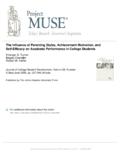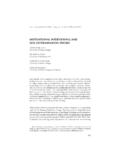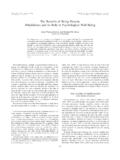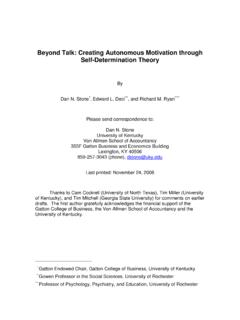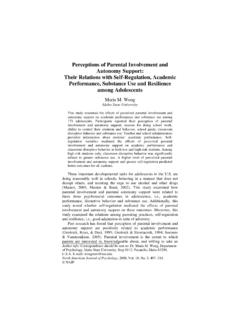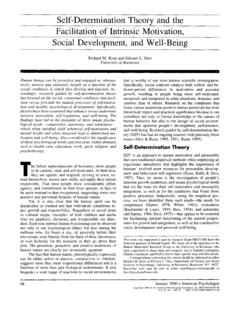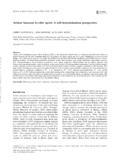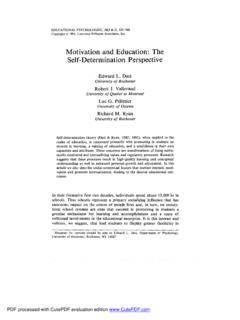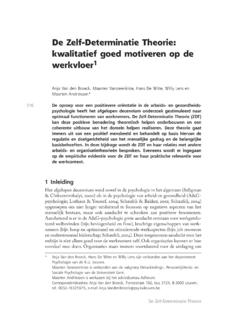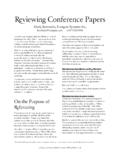Transcription of Extrinsic Rewards and Intrinsic Motivation …
1 Review of Educational ResearchlSpring 2001, VoL 71, No. 1, pp. 1-27 Extrinsic Rewards and Intrinsic Motivation inEducation: Reconsidered Once AgainEdward L. DeciUniversity of RochesterRichard KoestnerMcGill UnivervitvRichard M. RyanUniversity, of RochesterThe finding that exlrinsic rewvards can undernine Intrinsic Motivation has beenhighly controveisial itfirstoppeared (Deci, 1971). A meta-analysis pub-lished in this journal (Cameron & Pierce 1994) conc:luded thlat tlhe under-iniing effect was minimal and largely inm onsequentiialfor educational , a more recent meta-analysis (D)eci, Koestner, & Ryan, 1999)showed that the Cameron and Pie ce meta-analysis was seriousvh flawed andthat its conclusions i-ere incorrect. This article briefly r eviews the results ofthe more recent meta-analysis, which showed that tangible Rewards do indeedhave a substantial undermining effrct. The meta-analysis provided strongsupportfor cognitive evaluation theorv (Deci & Ryan, 1980), vhich Carneronand Pierce had advocated abandoning.
2 The results aie briefly discussed interms of their relevance for educational stars, best-student awards, honor roles, pizzas for reading, and otherreward-focused incentive systems have long been part of the cu-rreticy of intended to motivate or reinforce student learning, such techniques havebeen widely advocated by some educators, although, in recent years, a few com-inentators have questioned their widespread use. The coitroversy has beenprompted in part by psychological research that has demonstrated negative effectsof Extrinsic Rewards on students' Intrinsic Motivation to learn. Some studies havesuggested that, rather than always being positive niotivators, Rewards can at tinesundermine rather than enhance self- Motivation , ctuiosi-ty, interest, and persistenceat learning tasks. Because of the widespread ose of Rewards in schools, a carefuisummary of reward effects on Intrinsic Motivation would seemt to be of consi(ler-able importance for , in the Fall 1994 issue of Review oaf Fducational Research,Cameron and Pierce (1994) presented a meta-analysis of Extrinsic reward effectson Motivation , concluding that, overall, Rewards do not decrease mttrinsicmotivation.)
3 Implicitly acknowledging that Intrinsic Motivation is important foilearning and adjustment in educational setitings (see. , Ryan & La Guardia,1999), Cameron and Pierce nonetheless stated that "teachers have no reason , Koestner. cnl Ryanresist ~ ilcentive systems in the classroom" (p. 397). Thev also advo-cated abandoning Deci and Ryan's (1980) cogniitive evaluation tleory (CET),which had initially been lormulated to explain both positive and negative rewardeffects on irtrinsic the Spring 1996 issue of RER, three comlmenitaries were published (Kohn,1996: Lepper, Keavney, & Drake, 1996: Ryan & Dcci, 1996) arguing that Cameronand Pierce's meta-analysis was flawed anid that its conclusions were that sanie issue, and Pierce (1996) responded to the comnIentaries byclaiming that, rather than reanalyzing the data, the authors of the three conmmen-taries had suggested "that the findings are invalid due to intentional bias, deliber-ate misrepresentation, and inept analysis" (p.)
4 39). Subtitling their response "Protestsand Accusations Do Not Alter the Results," Cameron and Pierce stated that aniymeaningful c iticism of their aricle would have to include a reanalysis of the to that interchange, Fisenberger and Cameron (1996) published an arti-cle in the American Psychologist summarizing the Cameronl and Pierce (1994)nmeta-analysis and claiming that the so-cal'ed undermining of Intrinsic motivationby Extrinsic Rewards , which they said had become accepted as reality, was in factlargely a do not claim that there was "intentional bias" or "deliberate misrepresenta-txon" in either the Cameron and Pierce (1994) meta-analysis or the Eisenberger andCamneron (1996) article, but we do believe, as Ryan and Deci argued in 1996, thatCameron and Plierce used somiC inappropriate procedures and made numerousernrs in tneir meta-analysis. 'herefore, because we believe the problems with theirmeta-anaivsis made their conclusions invalid, because we agree that a useful critiqueof their article nmust involve reanalysis of the data, and because the issue of rewardeffcets on Intrinsic Motivation is extremely important for educators, we performeda new meta-analysis of reward effects on Intrinsic Motivation (Deci, Koester, &Ryan, 1999).
5 Our Ineta-analysis included 128 experiments, organized so as toprovide a test of CET, much as Cameron and Pierce had done. The new mneta-analysis, which we summarize in this article, showed that, in fact, tangible rewardsdo significantlv and substantiallv undermineinthinsic Motivation . The meta-analysisprovided strong support ior CER' and made clear that there is indeed reason forteachers to exercise great care when using reward-based incentive new meta-analysis was published in Psychological Bulletin (Deci ct al,1999). Included in that article was an appendix table (here reproduced with per-mission as Table I a) listing every study in the meta-analysis and explaining exactlywhere enors were made by Cameron and Picrce, how our meta-analysis correctedtheir errors, and what studies were included in ours that had been overlooked oronhitted bv them. The table allows interested readers to see for themselves exactlyhow it is that Carmeron and Pierce's meta-analysis and our ineta-analysis anived atsuch the seven years since the publication of Cameron and Pierce's (1994) article,academics, school administrators, and classroom teachers from many countrieshave spoken to uIs about the article, makihng it clear that the conclusions of the arti-cle had been widely disseminated and that the issue of reward effects is of consid-erable interest to educators around the world.
6 Given the great importance of thisissue for education, then, the current article is intended to set the record straight forthe many readers of RER. In this article, we provide a brief description of CEr,2 Extrinsic Rewards and Intrinsic Motivationbecause it has guided much of the research in the field. This is followed by a sum-mary of the methods and results of our meta-analysis and, finally, a discussion ofthe relevance of the results for Evaluation TheoryCET proposes that underlying Intrinsic Motivation are the innate psychologicalneeds for competence and self-deterimination. Accordfing to the theory, the effectson Intrinsic Motivation of external events such as the offering of Rewards , the deliv-ery of evaluations, the setting of deadlines, and other notivational inputs are afunction of how these events influence a person's perceptions of competence andlself-detenmination. Events that decrease perceived self-determination ( , thatlead to a more extemal perceived locus of causality) will undermine Intrinsic noti-vation, whereas those that increase perceived self-detenrination ( , that lead toa m]ore internal net ceived locus of causality) will enhance Intrinsic Motivation .
7 Fur-thernore, events that increase perceived competence will enhance Intrinsic moti-vation so long as they are accompanied by perceived self-detemination ( ,Ryan, 1982), and those that decrease perceived competence will dininish intrin-sic Motivation . Finally, Rewards (and other external events) have two aspects. Theiffo nnahional aspect conveys self-deteimined competence and thus enhancesintrinsic Motivation . In contrast, the controlling aspect prompts an external per-ceived locus of causality ( , low perceived self-determ3ination) and thus under-mines intrihsic noted, CET applies not orny to reward effects but to the effects of variousother external factors such as evaluations (Smith, 1975), deadlines (Amabile,DeJong, & Lepper, 1976), competition (Deci, Betley. Kahle, Abrams, & Porac,1981), and externally imposed goals (Mossholder, 1980), as well as to the generalclimate of classrooms, schools, anid other interpersonal settings ( , Deci, Connell,& Ryan, 1989: Deci, Schwartz, Sheinman, & Ryan, 1981).
8 In this article, however,we focus only on CET as an explanation for reward making predictions about reward effects on Intrinsic Motivation , CET ana-lyzes the type of reward and the type of reward contingency to determine whetherthe reward is likely to be experienced as informational or controlling. The theoryacknowledges that in some cases both the informational and controlling aspectswill be somewhat salient, so, in those situations, additional factors are taken intoaccount in making predictions. We begin our discussion of CET's reward-effectpredictions by distinguishing between verbal Rewards and tangible Rewards , conI-sidering verbal Rewards first and then moving on to tangible RewardsAithough we do not usually use the term verbal Rewards , preferring instead tospeak of "positive feedback," we do use that term here in order to include thepositive-feedback studies within the general category of reward effects. Verbalrewards typically contain explicit positive perfornance feedback, so CET predictsthat they are likely to enhance perceived competence and thus enhance intrinisicmotivation.
9 In the meta-analysis, we tested the hypothesis that verbal rewardswould enhance Intrinsic , verbal Rewards can have a significant controlling aspect leadingpeoplc to engage in behaviors specifically go gain praise, so verbal Rewards have3 Deci, Koestner, aind Ryanthe potential to undermine Intrinsic Motivation . The theory therefore suggests thatthe interpersonal context within wlich positive feedback is adrninistered can influ-ence whether it wili be interpreted as informational or controlling. As used here,the term interpersonal context refers to the social amnbience of settings, such asclassrooms, as they influence people's experience of self-detenninaton (I)eci &Ryani, 199 1). When studied in laboratory experinmets, thc interpersonal climate isusually manipulated in terms of the interpersonal style used by the experimenterwhen providing the feedback ( , Ryan, 1982; Ryan, Miins, & Koestner, 1983).An interpersonal context is considered controlling to the extent that people feelpressured by it to think, feel, or behave in particular ways.
10 Verbal Rewards admin-istered within such a context are thus more likely to be experienced as controllingrather than informational. For examiple, CFT suggests that if a teacher uses aninterpersonal style intended to make students do what he or she wants them to, ver-bal Rewards administered by that teacher are likely to be expenienced as control-ling. in a supplemiiental meta-analysis involving five studies, we tested the predictionthat controlling positive feedbaci lead to less Intrinsic Motivation than infor-inational positive Rewvar&dUnlike:verbal Rewards , tangible Rewards are freqsuently offered to people as aninducement to engage in a behavior in which they nmight not otherwise , according to CET, tangible Rewards will tend to be experienced as control-ling, and as a result they will tend to decrease Intrinsic mrotivation. The meta-analysis tested the hypothesis that, overall, tangible Rewards would decrease order for tangible Rewards to be experienced as controlling, however, peoplewould need to be engaging in the behavior for the Rewards ; that is, they would needto expect that the behavior would lead to the Rewards .
